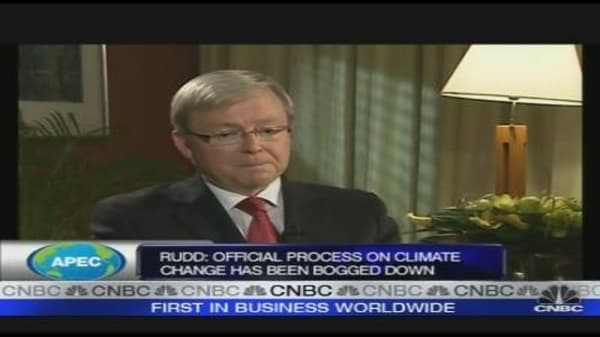Over the weekend, APEC governments have broadly agreed with Danish Prime Minister Lars Loekke Rasmussen's proposal to seek a politically binding agreement in the United Nations climate change conference in Denmark next month, but not a formal, legal deal imposing hard caps on countries' on gas emissions.
Rudd stressed that it is vital that the U.S. and China, the world's largest emitters of greenhouse gases, are on board.
"We need political leaders who will process to get an outcome for Copenhagn, and a resolve to head in that direction. And President Obama, President Hu Jin Tao are strongly on the bus for doing that," he said.
On APEC's final communique, which failed to spell out concrete goals on cutting global greenhouse gas emissions by 2050, Rudd said "there's horse trading, there're deals cut and it's going to be awhile before we get a precise landing point."
But he held out hopes for a breakthrough in Copenhagen.
"I'm trained in the great craft of the Australian political realism...Many obstacles lie in the way, but speaking as Prime Minister of Australia, and I believe on behalf of so many of my colleagues, we intend to give this thing a darn good go," he said.
Rudd, added that while free trade and climate change have underpinned discussions among the leaders, it was time to evolve to have a security-focused regional community.
"APEC has no security policy mandate. If you look for those with a potential security policy mandate, the ASEAN regional forum for example, it hasn't really taken off," he explained. "We have the emergence of the East Asia summit but it excludes the U.S., and APEC excludes India."
"Lets begin a discussion about how we evolved over time, an Asia Pacific community, which has a broad mandate, political, economic, security, climate change. In other words, a whole scope of our future engagements and one, which critically includes America and India as well. "



